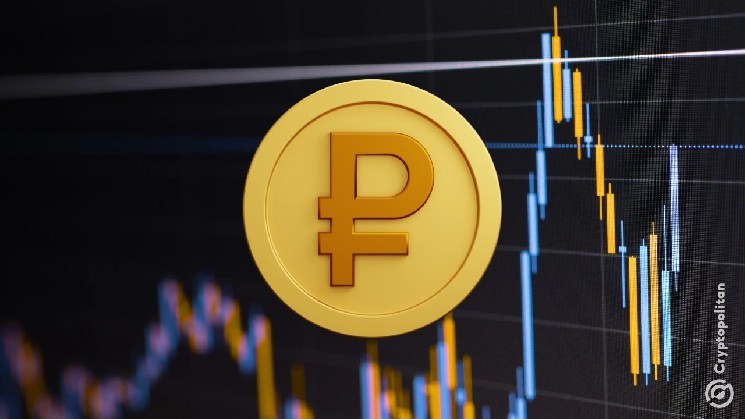BestChange, Russia’s largest cryptocurrency exchange aggregator, has imposed restrictions on the Russian ruble offering on dozens of coin trading platforms.
The move was in response to complaints from users of the company’s services about blocked bank cards. These have increased since Russia took steps to curb financial fraud, which also affected crypto trading.
BestChange withdraws offer of about 100 Russian rubles
BestChange.ru, the leading exchange aggregation website in the Russian-speaking region of the crypto market, has delisted Russian ruble trading pairs offered by 95 crypto exchange providers.
According to reports in Russian crypto media, the platform’s decision was prompted by numerous complaints and indications of a scheme known as the “White Triangle.”
The latter includes exchanges that act as intermediaries between buyers and sellers of cryptocurrencies, and funds are transferred directly between them.
Nikita Zbolev, a senior analyst at BestChange, explained to Russian business news agency RBC that the sums were often divided into smaller amounts and transferred from separate accounts, meaning the funds could have been used for suspicious transactions. He elaborated on his crypto page:
“Over the past few months, we have seen an increase in user complaints about the instability of bank card payments and the risks associated with sending money from unverified sources following transactions at a number of exchange offices.”
On October 15, BestChange showed “signs of low-quality ruble traffic” and began restricting high-profile exchange services, Zborev revealed.
Signs included payments made through unverified processors or peer-to-peer (P2P) platforms, inflated rates relative to average exchange rates, multiple small payments for a single request, confirmed complaints about split transfers, and temporary card blocks or return requests from senders.
“Of course, as a result of the new rules, interest rates that appear unnaturally advantageous will disappear from listings,” the Best Change representative emphasized.
Other experts interviewed by RBC last month warned that the better the prices of the cryptocurrencies being exchanged, the more likely it is that dirty money is involved.
The aggregator acknowledged that there was no hard evidence that any of the blacklisted exchangers were involved in illegal activities, but Zborev noted that it had taken temporary measures to protect its users.
He also emphasized that the measure only applies to Russian ruble transactions, and transactions denominated in other currencies are not affected.
Please add a screenshot of your BestChange website containing the following text:
BestChange.ru is Russia’s most popular cryptocurrency exchange aggregator.
https://www.bestchange.ru
Russia has adopted a series of legal reforms, presumably to combat various types of financial fraud, including on the Internet, and to address widespread criminal phenomena such as the buying and selling of money, colloquially known in Russian as “dropping.”
Some of the measures, such as blocking bank accounts in case of suspicious transactions and restricting cash withdrawals at ATMs, have been interpreted as targeting crypto traders as well, particularly cracking down on crypto-related transactions on a P2P basis.
Risks are rising for Russian P2P crypto traders
Commenting on Folklog, a leading Russian-language source of cryptocurrency news, Nikita Zborev predicted that the risks for users of P2P exchange services will increase.
He said he expected players who handle illicit funds to migrate to such platforms and be more likely to trade with “unscrupulous” traders. He also noted that:
“Users who do not care about the integrity of their funds will receive a more favorable exchange rate than before.”
Zborev also pointed out that anti-money laundering (AML) practices for fiat currency transactions in this market are virtually non-existent due to their complexity.
He believes that the know-your-customer (KYC) and know-your-transaction (KYT) procedures that established crypto exchanges have in place are the most effective preventative measure.
BestChange has been in trouble with Russian authorities in recent years. This aggregator has been taken offline multiple times to disseminate cryptocurrency trading information.
Access to the company’s website was last restricted in April this year, after the Federal Supervisory Service for Communications, Information Technology and Mass Media (Russia’s communications watchdog, also known as Roskomnadzor) added the company’s domain to its register of prohibited internet sources. As reported by Cryptopolitan, this restriction was lifted in August.


